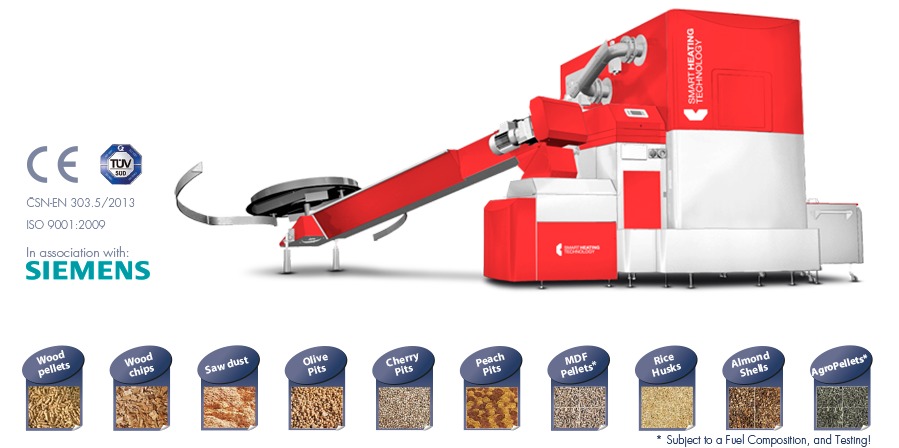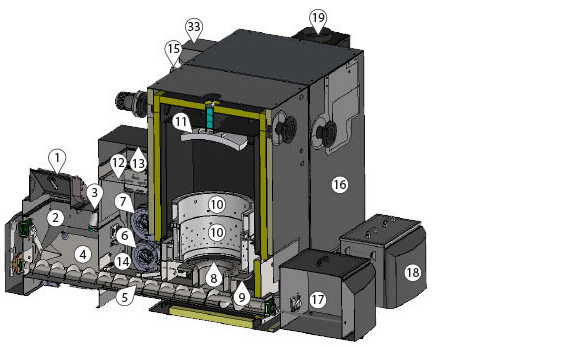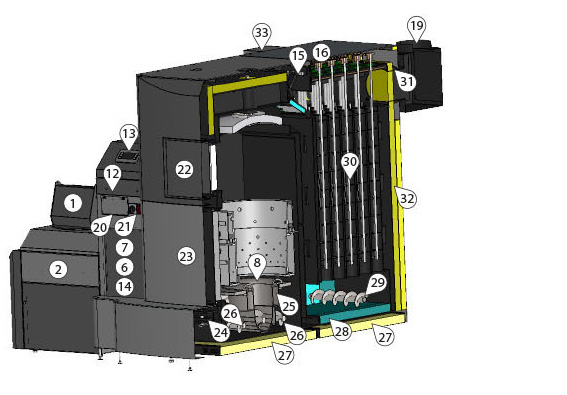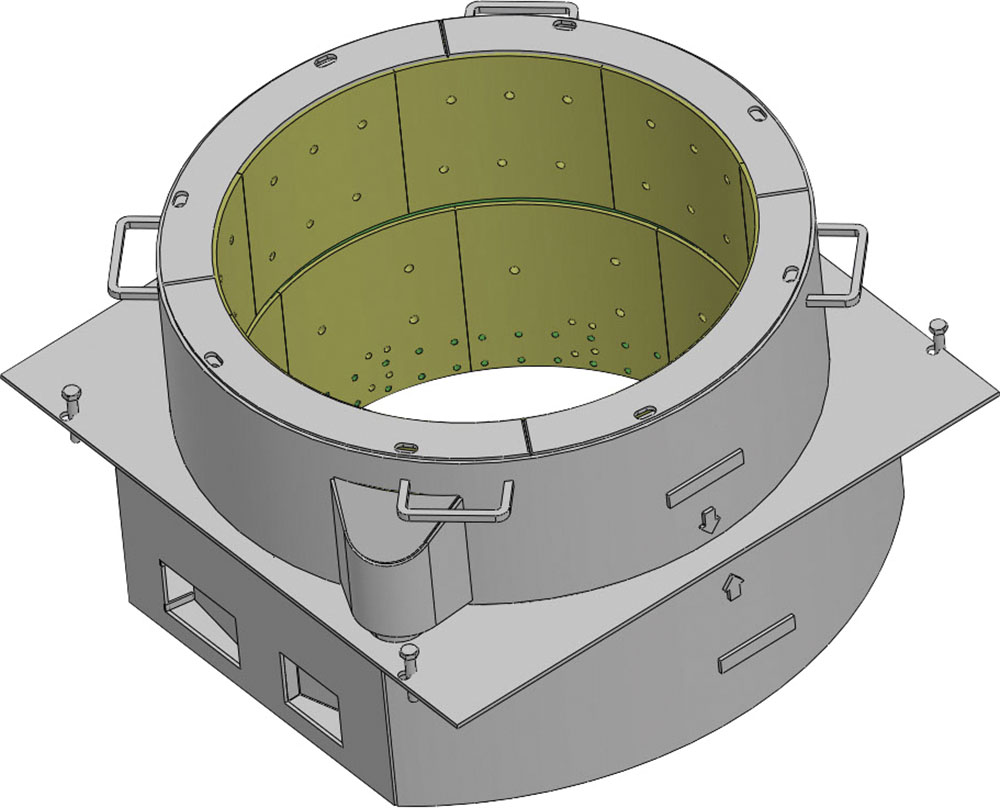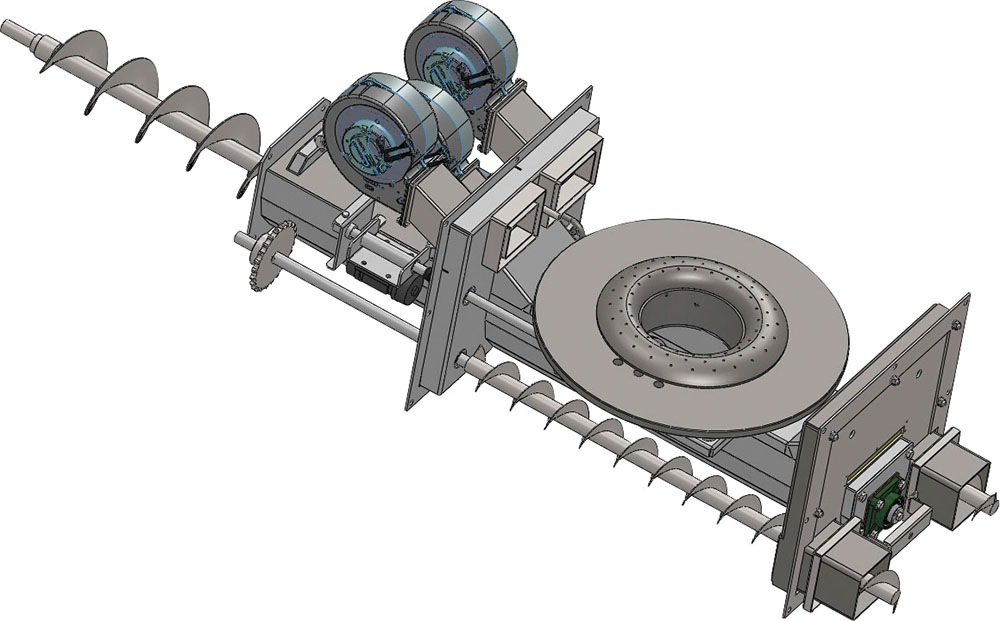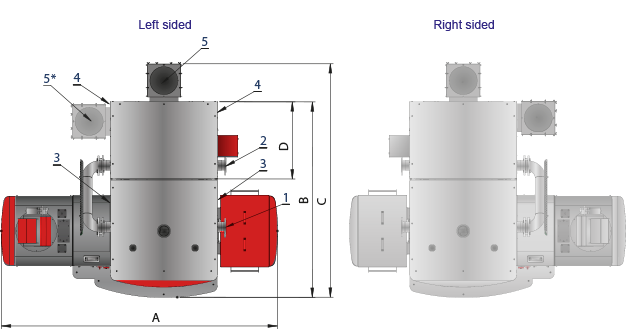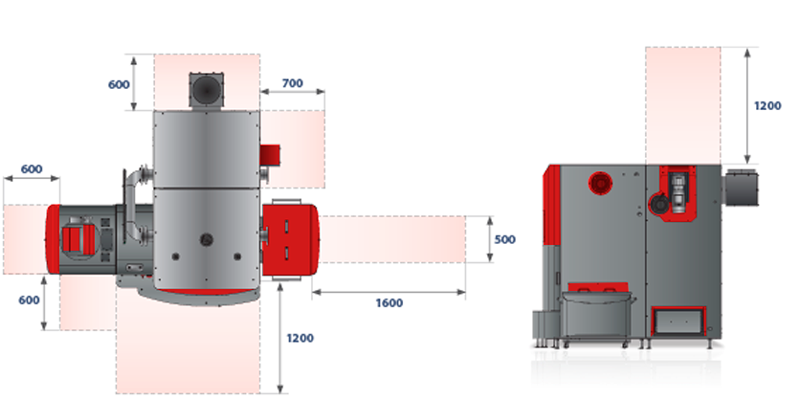| SMART BOILERS OPERATING DATA |
| Marking |
|
400 |
| Nominal power Pn |
kW |
400 |
| Partial load (power) Pp |
kW |
100 |
| Boiler efficiency at Pn |
% |
>95 |
| Boiler class |
|
5 |
| Water volume |
l |
790 |
| Diameter of water connection |
“ |
4 |
| Diameter of water connection |
DN |
100 |
Hydraulic-pressure drop of the boiler
at the temperature fall 20° |
mbar |
110 |
| Boiler temperature |
°C |
60–90° |
| Minimal temperature of returnable water |
°C |
55 |
| Maximal operational pressure |
bar |
3,5 |
| Test pressure |
bar |
6,5 |
| Temperature of furnace |
°C |
900–1100 |
| Pressure of furmace |
mbar |
-0,04 |
| Required draught of the chimney |
mbar |
0,2 |
| Requirement for the forced draught |
|
Yes |
| Combustion temperature at Pn |
°C |
98,9 |
| Combustion temperature at Pp |
°C |
62,7 |
| Diameter of flue gas duct |
mm |
300 |
| Diameter of chimney |
mm |
350 |
| Wood pellets – C1 |
Testedfuel |
D6, M10, A1,5, DU90,0 |
| Wood chips – B1 |
P45, M30, A3.0 |
| Electrical connection |
|
3+N+PE 50Hz 230/400V TN-C-S |
| Conveyor engine |
W |
550 |
| Feeding auger engine |
W |
550 |
| Exchanger cleaning engine (s) |
W |
2 x 550 |
| Ash-removing engine |
W |
550 |
| Fan of primary air |
W |
66 |
| Fan of secondary air 1 |
W |
170 |
| Fan of secondary air 2 |
W |
170 |
| Chimney exhaust fan |
W |
1100 |
| Electrical ignition |
W |
1600 |
| Separation flap valve |
W |
6,5 |
|
| Wood pellets |
Wood chips |
| Rated |
Minimum |
Rated |
Minimum |
| Rated heat capacity |
kW |
400 |
400 |
400 |
400 |
| Combustion producttemperature |
°C |
95,1 |
62,0 |
98,9 |
62,7 |
| Fuel consumption |
kg/hour |
90,70 |
20,60 |
98,30 |
22,90 |
| Input water temperature |
°C |
60,2 |
61,1 |
59,7 |
57,9 |
| Outlet water temperature |
°C |
77,8 |
76,5 |
75,4 |
74,1 |
| Cooling water temperature |
°C |
9,4 |
10,4 |
9,6 |
11,0 |
| Cooling water flow rate |
m3/hod |
19,311 |
5,110 |
22,025 |
5,135 |
| Draught behind boiler |
Pa |
173,0 |
25,0 |
170,0 |
26,0 |
| Ambient temperature |
°C |
27,0 |
24,0 |
28,0 |
24,0 |
| Relative air humidity |
% |
32,0 |
33,0 |
35,0 |
35,0 |
| Barometric pressure |
kPa |
99,10 |
99,30 |
99,05 |
99,15 |
| Oxygen O2 |
% |
8,06 |
9,43 |
7,24 |
10,73 |
| Carbon dioxide CO2 |
% |
11,26 |
10,10 |
11,95 |
9,31 |
| Carbon monoxide CO |
ppm |
105 |
111 |
139 |
167 |
| Higher hydrocarbons OGC |
ppm |
9 |
3 |
2 |
6 |
| Nitrogen dioxides Nox |
ppm |
68 |
67 |
100 |
65 |
| Dust |
mg/m3 |
25 |
29 |
66 |
67 |
| Carbon monoxide CO |
mg/m3 |
116 |
144 |
140 |
227 |
| Higher hydrocarbons OGC |
mg/m3 |
5 |
2 |
1 |
3 |
| Nitrogen dioxides Nox |
mg/m3 |
118 |
130 |
164 |
139 |
| Dust |
mg/m3 |
20 |
29 |
30 |
48 |
| Mass flow rate gases |
kg/sec |
0,276 |
0,068 |
0,257 |
0,074 |
| Stoichiometric oxygen value |
m3/kg |
0,958 |
0,957 |
0,832 |
0,830 |
| Stoichiometric air value |
m3/kg |
4,560 |
4,559 |
3,961 |
3,951 |
| Stoichiometric volumeof dry combustion products |
m3/kg |
4,449 |
4,447 |
3,882 |
3,872 |
| Stoichiometric air multiple |
|
1,62 |
1,85 |
1,52 |
2,08 |
| Volume of dry combustion products, actual |
m3/kg |
7,521 |
8,442 |
6,294 |
8,106 |
| Volume of H2O in the combustion air |
m3/kg |
0,082 |
0,085 |
0,080 |
0,134 |
| Volume of H2O in the combustion produts |
m3/kg |
0,937 |
0,940 |
0,926 |
0,935 |
| Maximum volume CO2 |
% |
19,01 |
19,01 |
19,37 |
19,36 |
| Loss of sensible heat of combustion products (chimney) |
% |
4,8 |
3,0 |
4,7 |
3,2 |
| Loss of gas underburning |
% |
0,1 |
0,1 |
0,1 |
0,1 |
| Loss of mechanical underburning |
% |
0,0 |
0,1 |
0,4 |
0,6 |
| Loss of heat transfer into the environment |
% |
0,5 |
1,1 |
0,5 |
0,9 |
| Total loss |
% |
5,3 |
4,2 |
5,4 |
4,6 |
| Efficiency – indirect method |
% |
94,8 |
95,9 |
94,7 |
95,4 |
| Heat input |
kW |
417,2 |
94,9 |
420,1 |
98,1 |
| Heat capacity |
kW |
398,0 |
91,0 |
401,8 |
94,0 |
| Uncertainty of determining heat capacity |
% +/- |
16,7 |
3,8 |
16,9 |
4,0 |
| Efficiency – direct method |
% |
95,4 |
95,9 |
95,6 |
95,8 |
| Capacity / rated output |
% |
99,5 |
22,8 |
100,9 |
23,9 |
|
